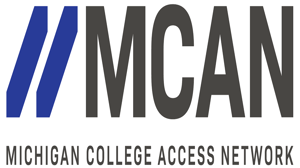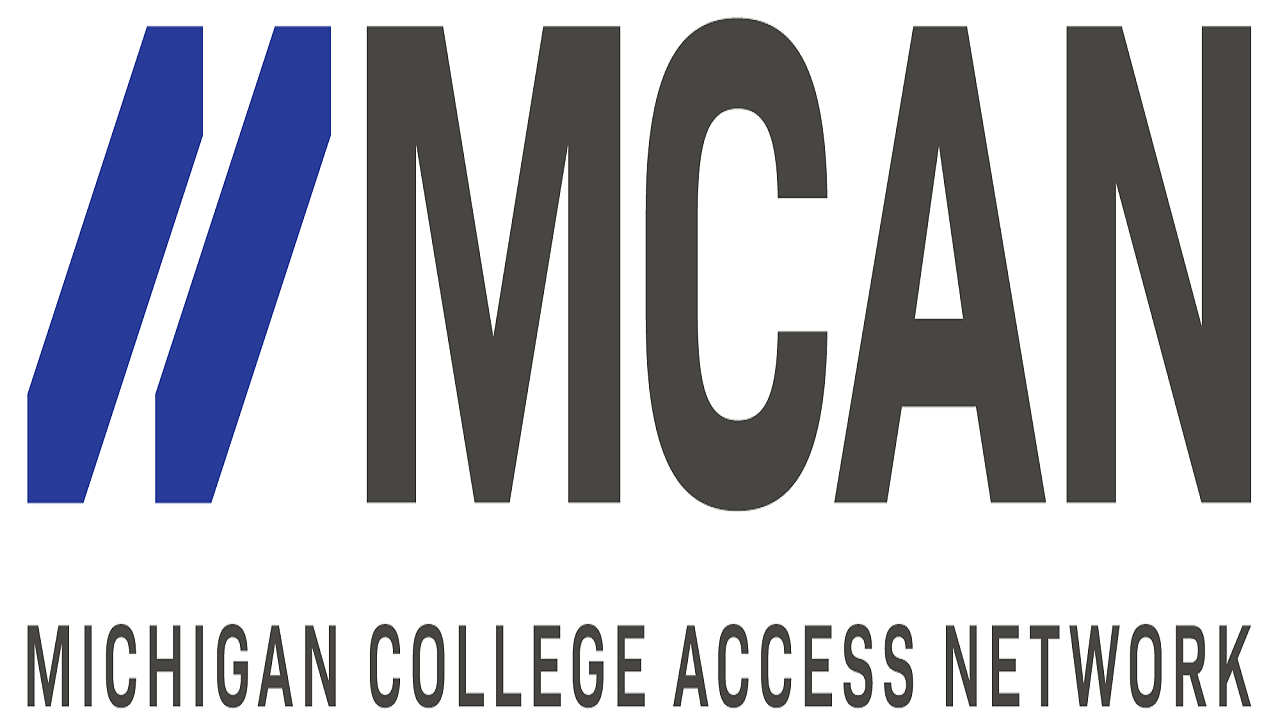
Chris Holman welcomes Jamie Jacobs, Deputy Director, MCAN, Michigan College Access Network, Lansing, MI,
Watch Jamie and Chris discuss MCAN's efforts in 2024, and how they're reacting to policy and planning from agencies in Lansing as it impacts college affordability and access in Michigan, in the YouTube video shared below:
In their conversation, Chris looked to find out several things from Jamie;
Remind our listeners about MCAN?
What have been some highlights in recent months?
What's MCAN's reaction to the Governor's State of the State, and recent budget announcements?
Do you have other issues keeping you busy connected to the legislature in Lansing?
MCAN has been busy on other projects and efforts recently as well!:
Michigan College Access Network joins partnership to improve postsecondary education access for incarcerated adults
Initiative will provide resources for higher education institutions to effectively support marginalized populations
LANSING, Mich. — Michigan College Access Network (MCAN) recently announced a partnership with the Michigan Consortium for Higher Education in Prison (MiCHEP) to increase postsecondary education accessibility for incarcerated adults in Michigan. This joint effort is in alignment with the state’s goal of Sixty by 30 — 60% of Michigan adults earning a postsecondary degree or certificate by 2030.
Through the Ascendium Fellowship Program presented by the National College Attainment Network (NCAN), MCAN and MiCHEP, along with seven other organizations across the nation, will participate in a project aimed at supporting students who are incarcerated or formerly incarcerated in pursuing postsecondary education. Fellows will meet monthly to learn from one another and to hone and strengthen their strategies for supporting the students who are or were incarcerated on their journey to attain a postsecondary education. Fellows will also contribute to a comprehensive college access and success guidebook and other valuable resources aimed at helping programs that support this population of learners. This is a pivotal moment for Michigan’s educational system, aiming to establish sustainable, long-term pathways for success for one of the most marginalized populations in the state.
“The new Pell Grant for Prison Education Programs launched on July 1 by the U.S. Department of Education offers a powerful opportunity to advance racial and economic justice,” said NCAN in a statement announcing the fellowship. “For the first time since the 1990s, people who are incarcerated will be able to access Pell Grants to pay for postsecondary education.”
The following institutions have seats on the MiCHEP Steering Committee or will be joining within the next 9 months:
-
Calvin University and Calvin Theological Seminary (Calvin Prison Initiative)
-
Delta Community College
-
Eastern Michigan University
-
Ferris State University
-
Grand Valley State University
-
Hope College and Western Theological Seminary (Hope-Western Prison Education Program)
-
Jackson College
-
Kellogg Community College
-
Lake Superior State University
-
Mott Community College
-
Siena Heights University
-
Western Michigan University
“The Michigan Consortium for Higher Education in Prison is very pleased to partner with MCAN on our shared goal of increasing college attainment,” said Richard Ray, co-director of the Hope-Western Prison Education Program and MiCHEP steering committee chairperson. “As a collective of colleges and universities committed to the very highest standards in higher education for incarcerated students, we couldn’t be happier to draw upon MCAN’s relationships and networks to push the college-in-prison movement forward for the benefit of incarcerated students, their non-enrolled peers in Michigan prisons, corrections staff, and citizen-taxpayers. Each of these groups wins when incarcerated people earn college degrees.”
“We know that postsecondary education is a transformational opportunity for people who are incarcerated. Offering the chance to earn a college degree or certificate in prison helps reduce recidivism and creates economic opportunities for returning citizens,” said Ryan Fewins-Bliss, MCAN executive director. “We are excited to formalize a partnership with MiCHEP and help build an effective strategy to reshape Michigan’s prison education system for years to come.”
MCAN and MiCHEP will work in tandem to accelerate efforts to become a trusted source of information and best practices to support incarcerated students in finding resources for postsecondary education. With over 3,000 incarcerated people currently awaiting college enrollment, MCAN and MiCHEP will work alongside the Michigan Department of Corrections to make opportunities available to eligible individuals.
For more information about MCAN’s MiCHEP partnership or other adult education initiatives, please contact Patrick Brown, MCAN director of adult student attainment strategy, at patrick@micollegeaccess.org.
MCAN had initially reacted to the Governor's State of the State address:
Michigan College Access Network responds to Gov. Whitmer’s free community college plan
Governor announced push for two years of community college at State of the State address
LANSING, Mich. — In January, Gov. Gretchen Whitmer delivered her sixth State of the State address, where she laid out a wide-ranging plan to boost Michigan’s population growth and improve economic prosperity. MCAN is particularly enthusiastic about the governor’s plan to provide two years of tuition-free community college for all Michigan high school graduates, regardless of age. Two years of free postsecondary education was a key recommendation by the Growing Michigan Together Council, who noted postsecondary attainment is “directly correlated with higher-paying jobs and the ability to recruit the next generation of employers.” MCAN Executive Director Ryan Fewins-Bliss is a member of the Higher Education Workgroup that helped advise the Growing Michigan Together Council’s final recommendations.
 Statement from MCAN Executive Director Ryan Fewins-Bliss (left):
Statement from MCAN Executive Director Ryan Fewins-Bliss (left):
“Gov. Whitmer understands that if Michigan is going to compete in the 21st century economy, we need to get more residents to and through college. As we position our state to be leaders in renewable energy, electric vehicles, modern manufacturing and emerging technologies, we need to invest in a future-ready workforce that can attract and retain high quality employers. As we push to make postsecondary education affordable for all Michiganders — especially low-income people, potential first-generation college-going students, and people of color — two years of free community college is a powerful investment in our residents that will pay huge dividends down the road.
“We know that postsecondary attainment directly correlates to benefits beyond individual economics, including better health outcomes, decreased reliance on public assistance, lower crime rates, and increased civic engagement. The governor’s free community college plan, in addition to the groundbreaking Michigan Achievement Scholarship, will open the doors of postsecondary education for thousands of students who were previously locked out of these opportunities and the accompanying benefits, helping us build stronger communities and more economically stable families.
“As we look ahead to budget season, MCAN is eager to work with Gov. Whitmer and the legislature to craft a budget with bold educational investments that move us closer to Sixty by 30 and support Michiganders, in the governor’s words, ‘from pre-K, through postsecondary, to prosperity.’”
###
And finally MCAN keeps their eyes on reports coming out:
In 2022, Michigan’s per capita income was 13 percent below the national average. The state’s economic standing has plummeted drastically in recent years — highlighting the importance of a stable educational foundation.
MCAN along with other included in the Michigan Higher Education Coalition, understands the importance of education when it comes to economic development and top talent retention. The coalition recently updated their recommendations for enhancing the talent pool within Michigan. As we enter an election year, it’s pivotal to discuss the economic future for the state of Michigan.
The Top 10 List can be found HERE.
MIHEART’s top ten recommendations include:
-
Improving postsecondary participation and completion rates by closing opportunity and achievement gaps
-
Increasing FAFSA completion among Michigan high school students annually to 75 percent
-
Making college more affordable by sustaining investment in the Michigan Achievement Scholarship
-
Increasing postsecondary institutional annual operating support and emphasizing support for the whole-education system to build a foundation that sets low-income students, first-generation college-going students, students with disabilities and students of color on a path for success
-
Sustaining investment in and expanded eligibility for Michigan Reconnect
-
Allocating additional resources and aligning programs to support adult worker training and retraining
-
Increasing high school student participation in and completion of all forms of early college credit programs
-
Reducing the student-to-school counselor ratio for all students and providing high quality training and professional development for existing school counselors
-
Continuing progress toward multi-institutional credit acceptance among higher education institutions
-
Elevating and scaling national and state best practices and strategies among all partners of the new Office of Higher Education
ABOUT MICHIGAN COLLEGE ACCESS NETWORK
As the leader in the state’s college access movement, MCAN works to improve the futures of Michigan’s students and communities by making college accessible to all. MCAN’s work centers on one main goal: To increase Michigan’s postsecondary educational attainment rate to 60% by 2030. MCAN engages partners statewide who are committed to systems-level change and the reduction of barriers to increase college readiness, participation and completion rates, particularly among low-income students, first-generation college-going students, and students of color. For more information, visit micollegeaccess.org.
» Visit MBN website: www.michiganbusinessnetwork.com/
» Subscribe to MBN’s YouTube: www.youtube.com/channel/UCqNX…
» Like MBN: www.facebook.com/mibiznetwork
» Follow MBN: twitter.com/MIBizNetwork/
» MBN Instagram: www.instagram.com/mibiznetwork/









.webp)





